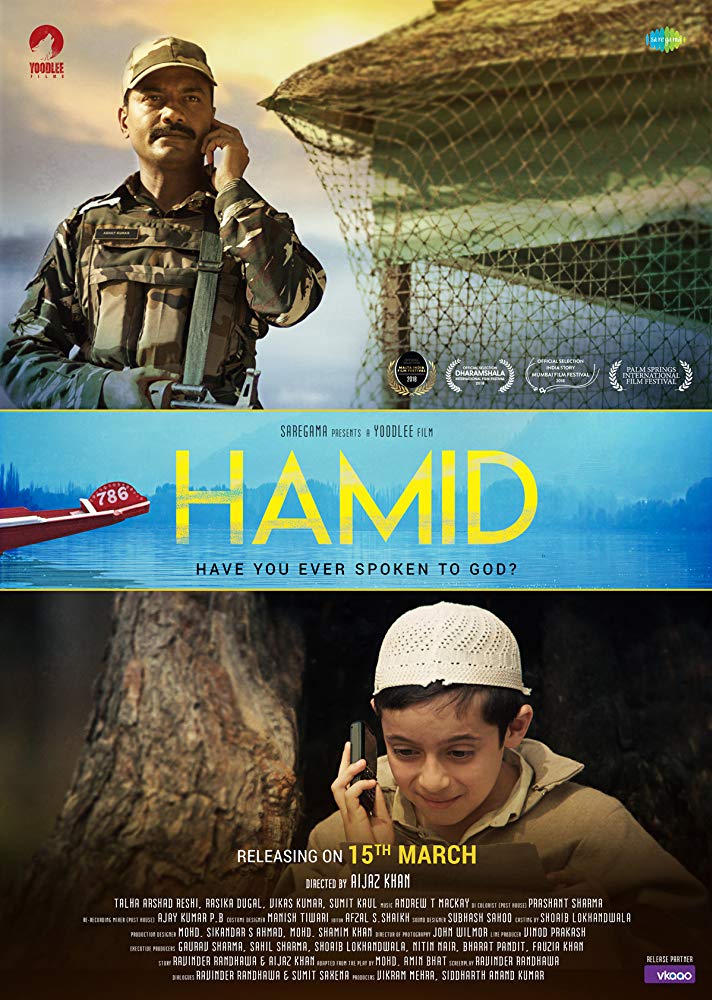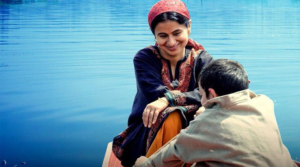
DFW SAFF 2019 Film Review “Hamid”
WATCH THE TRAILER HERE
First, the Recap:
When conflict is boiling over, can there still be peace? When loss is experienced, can there still be solace? When injustice seems to rule the day, can there still be hope? The elusiveness of these elements during times of upheaval, whether emotionally or occurring all round us, can be overwhelming and constant, causing us to be bereft of any sense that a respite from our strife is imminent. More so when we’ve suffered the grief of being deprived of someone who meant the world to us, how exactly can we be expected to just “bounce back” and continue? For a resident boatbuilder in Kashmir named Rehmat (Sumit Kaul), daily life is one filled with possible dangers and consistent unsettledness.
A citizen caught in the midst of the strife between Pakistan and India (plus the ever-present CRPF forces that guard the outskirts of their town) over his beloved country, Rehmat finds at least some sense of normalcy in his wife Ishrat (Rasika Dugal) and son Hamid (Talha Arshad Reshi). However, when Rehmat doesn’t return home one night, it becomes evident the worst may have happened, now leaving Ishrat and Hamid without a treasured husband and father, buried in sorrow and growing indifference. Having been advised that the number “786” belongs to God, Hamid sets out to call the number and attempt to ask God for his father back. Who he ultimately gets, unbeknownst to him, is CRPF soldier Abhay (Vikas Kumar), who plays along even as their interactions reshape both their worlds forever.
Next, my Mind:
Enjoying its Texas premier as the closing night offering at the 2019 Dallas Fort Worth South Asian Film Festival sponsored by Toyota USA, the new indie feature film from director Aijaz Khan carries with it a sense of impeccability and untarnished morality while also presenting within its narrative an innate bluntness that illustrates the reality of what it is to lose, become dispassionate, and nearly drown in melancholy before finally being awoken and realizing that letting go will never be easy, but that doing so and moving on is a necessary and ultimately redeeming experience that can change the very nature of how we see what we still have and therefore cherish it that much more. Put into the further context of the actualities of one country’s struggle for freedom against those who would desire to instead maintain control, the beauty here is that there’s a completely evenhanded approach to showcasing the conflict that acts as the backbone to the story rather than some overt effort to make a blatant political statement that only supports one side’s viewpoint.
This facet of the film alone is actually quite refreshing, especially in this current political climate where the aim to destroy the opposition through slander, mudslinging, and “fake news” is, sadly, paramount. We witness the toll taken on those who are oppressed and those initiating the oppression, a vivid picture of discontent and, sometimes, total hate perhaps disguised as nationalistic pride. But, we then arrive to the real heart and soul of the story–the innocence of a child and his simple yet affectingly, heartwarmingly, and understandably earnest desire to have his father back and the catalyst that comes around which sends him on a journey via cell phone and subsequently into contact with “God”, who’s really a CRPF solider, unexpectedly creating a deep bond between the two that transcends the clashes happening around them and reaches into their very beings, changing them from within, teaching them lessons they both needed, all while a young boy continues to literally work on completing a dream his father had that ultimately becomes a stirring symbol of rebirth, renewal, and healing during the film’s stirring finale.
What strikes the viewer throughout is the ardent fervor and determination demonstrated by Hamid in attempting to do anything it takes to believe his father will return while in the meantime his mother is sinking further and further into the utterly distant, detached, and disconnected state of being and shock to the soul she’s encountered since her husband’s disappearance, even to the extent of keeping a police file on him at the ready, holding onto anything she can in her denial of reality while alienating Hamid in the process. This building tension and pressure, however, only makes the release they both finally get that much more believable and genuine, with denial left behind, acceptance entering their sphere, and relinquishment of sorrow finally brought about. Visually, the film very astutely captures both the calm and the chaos, highlighting the absolutely stunning vistas Kashmir offers while also showcasing the overall intense atmosphere in the city Hamid and his mother reside, with confrontations the Kashmiri citizenry have with the CRFP placed in just the right moments to emphasize just how volatile people on both sides are.
This critic still remains amazed by the level of acting talent discovered amongst child thespians, and the delightfully winning performance turned in by Reshi is nothing short of astonishing in its uncomplicated execution infused with a magnitude of total realism and charming but fiery intensity as Hamid, an 8-year old Kashmiri boy whose entire world centers on his doting mother and father in the midst of societal and political collision. Managing to exist peacefully enough in looking at the world through more trusting eyes, Hamid’s reality is shaken to the core upon the enigmatic disappearance of his father, which throws both Hamid and his mother into a tailspin of emotional turmoil and despair. Events transpire that cause Hamid to believe he’s found out the contact number for God, which he ascertains how to call via cell phone and open an ongoing dialogue with the Almighty, or so he believes. As the conversations unfold, other actions ensue that begin to shape the lives of those around Hamid as well as his own, and vice versa for “God”, a solider in a CRPF. As Hamid learns the value of what it is to show the value of compassion and the injustice of hate and anger, it alters his entire outlook on life and leads him to reclaim his lost father in a wholly new way, freeing him to let go and see life anew. Throughout this odyssey, Reshi demonstrates a maturity well beyond his age and completely engages the viewer from start to finish with poise and well-played style.
Likewise, well-established actress Dugal, whom this critic had the opportunity to meet in NYC back in 2017 while she was supporting the short film “The School Bag“, brings to bear her wonderfully understated but no less emotionally powerful acting prowess for the role of Ishrat, Rehmat’s wife who appears to have not just taken the disappearance of her husband hard, but to the point of utterly closing off the entire actuality around her, going about daily existence with no true sense of purpose other than to melancholically hold on to some modicum of hope, like Hamid, that Rehmat will be found, though she really knows otherwise. Choosing to not take part in anything but mundane, everyday activities other than going to the local police station with her husband’s file, the lack of attention to her own son becomes achingly apparent, only emphasizing the place of inner disconnection she’s been brought to. But, as events begin to escalate politically in their little town, forcing her to face head-on the truths she still resists, it turns into the primary catalysts that not only bring her that inward acceptance and release she needs, but reunites her with her Hamid, who is then able to do the same. The final moment in the film as the pair finally connect again is beautifully heartfelt, and Dugal makes us feel every moment of both Ishrat’s brokenness and emancipation, delivering it with her consistent grace and purposeful performance.
We then come to Kumar, who also take his place in the spotlight with a straightforward fierceness and intentionality as Abhay, a passionate but sometime overly volatile soldier in the CRPF keeping watch over their designated area outside of the town Hamid and his family reside. More than taking much of the civilian unrest personally, he has plenty of chances to try and assert himself beyond protocol, not at all hiding his disdain for the Kashmiri people’s outrage at the political atmosphere and subjugation they feel they are under. Abhay’s phone rings one day and, in answering it, what starts as a mild annoyance and curiosity turns into a bond with a young boy that sheds light on his own faults, the need to change his outlook about duty and purpose, amend how he feels about the Kashmiri people, and introduce random acts of kindness that will permanently transform him in ways he never would have thought possible. Kumar’s evident, impassioned, full-hearted performance hits hard on multiple levels and makes us first be against him, but then root for him by the time we know Abhay’s metamorphosis is sincere. Supporting turns are present from Kaul as Rehmat, a dutiful and doting father whose sole goal is to love, protect, and provide for Hamid and Ishrat in the turbulent times they reside in, and who ends up being the medium through which the story actually begins, along with key roles from Bashir Lone, Gurveer Singh, Ashraf Nagoo, Mir Sarwar, Qazi Faiz , Umar Adil and Gunjan Sinha.
In total, “Hamid” is the style of emotive drama that can change our view of so many facets of the contemporary day and age we reside in by providing us true insight into actual events occurring as a backdrop for fictional but no less authentic characters and narratives that serve as a needed reminder that as we’ve learned from other films present at DFW SAFF 2019, love, healing, being there (even if unknowingly) for another soul in need, a willingness to see both sides of things, and human connection can truly change the world. Be sure to check out “Hamid”, as it is now streaming on Netflix!
As always, this is all for your consideration and comment. Until next time, thank you for reading!





